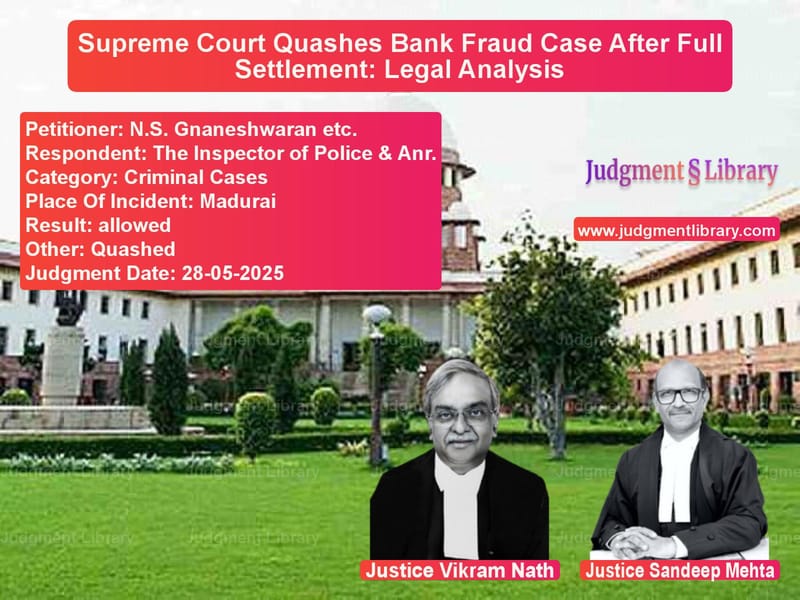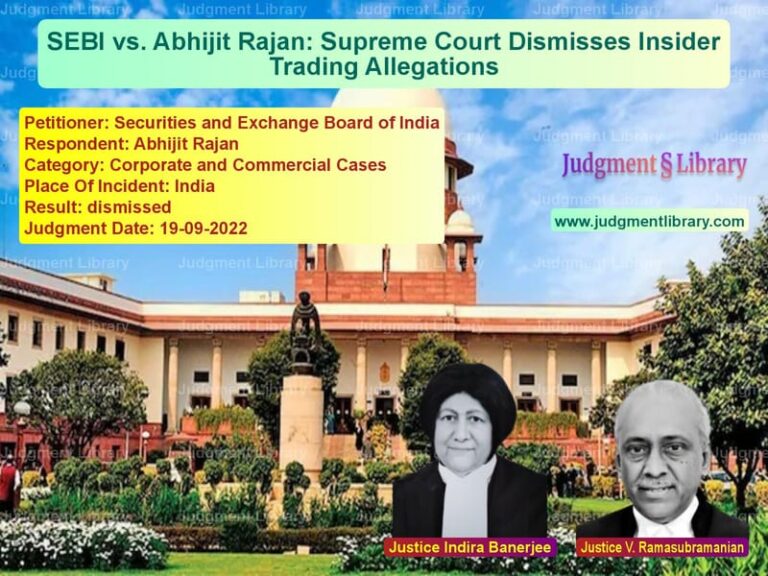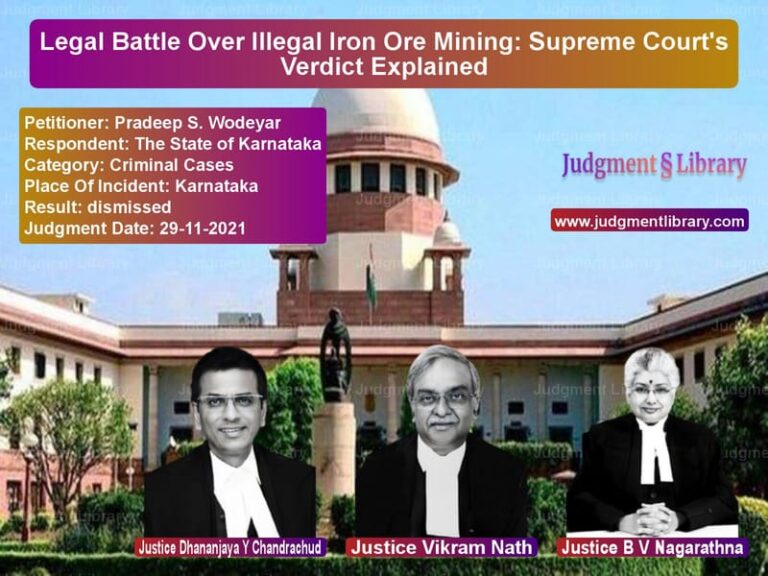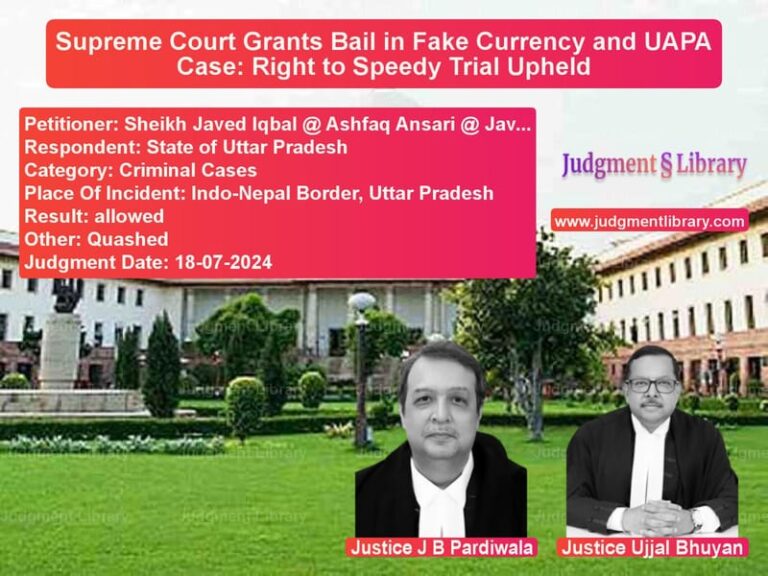Supreme Court Quashes Bank Fraud Case After Full Settlement: Legal Analysis
In a significant ruling that examines the delicate balance between criminal justice and financial resolution, the Supreme Court of India has delivered a judgment that quashes criminal proceedings in a bank fraud case after the involved bank accepted a complete One Time Settlement and issued no dues certificates. The case involving brothers N.S. Gnaneshwaran and N.S. Madanlal offers profound insights into when criminal proceedings should continue versus when they become redundant after comprehensive financial resolution.
The legal saga began with FIR No. RC MA1 2005 0020 registered on April 27, 2005, based on a complaint from a bank alleging fraudulent activities that caused a wrongful loss of Rs. 25.89 lakhs. The appellants found themselves as accused numbers 3 and 6, facing serious charges including criminal conspiracy, cheating, forgery, and using forged documents as genuine under Sections 120B, 420, 468, and 471 of the Indian Penal Code, alongside charges under the Prevention of Corruption Act.
The prosecution’s case depicted an elaborate scheme of financial manipulation. According to the allegations, Gnaneshwaran was “instrumental in orchestrating the fraudulent diversion of funds sanctioned to M/s Vinayaka Corporation.” The charge sheet detailed how he “facilitated the encashment of multiple cheques drawn from the fraudulently obtained credit limit, using a network of relatives, employees, and fictitious identities” and further accused him of forging “signatures and diverted the funds through various accounts linked to his family members and associates.”
His brother Madanlal faced allegations that he “assisted in the scheme by operating a Bank account in the name of Bharathi Traders along with his wife, through which cheques were deposited and funds withdrawn.” The prosecution claimed he was actively involved in the execution by “physically filling in cheques and ensuring their credit and encashment as part of the larger conspiracy to siphon off funds from the Bank.”
The Legal Journey Through Courts
Simultaneously with the criminal proceedings, the bank had initiated recovery proceedings before the Debt Recovery Tribunal in Chennai, demonstrating the dual approach financial institutions often employ – pursuing both criminal prosecution and civil recovery for the same transactions. This dual approach would eventually become central to the Supreme Court’s analysis.
The case witnessed several crucial developments before reaching the Supreme Court. In a related matter, the High Court had quashed proceedings against accused number 7, who happened to be Gnaneshwaran’s wife, through an order dated January 7, 2023. When the state challenged this decision before the Supreme Court, the special leave petition was dismissed on March 26, 2021, making the quashing final.
More significantly, in identical cases numbered C.C. Nos. 13 of 2006 and 151 of 2010, involving the same appellants and based on identical transactions, the High Court had quashed proceedings after noting a settlement between principal accused and the bank for Rs. 52,79,000. The High Court extended this relief to the appellants based on parity, establishing that similarly situated individuals should receive similar legal outcomes.
The pivotal moment arrived when the bank introduced a One Time Settlement scheme, which the main borrowers – accused numbers 4 and 5 – availed. Following full repayment, the bank recorded its satisfaction in pending recovery proceedings, which were dismissed as settled on December 15, 2023. The Debt Recovery Certificates were recalled, and No Dues Certificates were formally issued, indicating the financial institution had received complete compensation.
Armed with this settlement, the appellants approached the High Court under Section 482 of the Criminal Procedure Code, seeking quashing of criminal proceedings. However, the High Court dismissed their petitions on November 19, 2024, observing that “the stage of trial was advanced and held that the criminal proceedings could not be quashed merely on the basis of the OTS when a prima facie case was made out.” This rejection brought them to the Supreme Court’s doors.
The Competing Arguments
The appellants’ counsel presented compelling arguments before the Supreme Court. He emphasized that “the dispute in question arises out of a commercial transaction which has since been amicably resolved through a One Time Settlement scheme extended by the Bank.” This characterization of the case as essentially commercial rather than purely criminal proved strategically effective.
The counsel further highlighted that “the recovery proceedings initiated by the Bank have been fully settled, no dues remain, and the Bank has formally issued certificates recording its satisfaction.” This factual assertion demonstrated that the victim institution had no remaining financial interest.
Another powerful argument centered on equal treatment. The counsel “urged that the appellants are similarly placed to other co-accused against whom proceedings have already been quashed, and that the continuation of proceedings in the present matter would amount to unfair treatment.” This principle of parity carried significant judicial weight.
Additionally, the counsel challenged the Prevention of Corruption Act charges, submitting “that the offences under the Prevention of Corruption Act are not attracted in the case of the appellants, who are private individuals and not public servants.”
The state’s counsel presented counterarguments emphasizing allegation seriousness. They contended that “the settlement of dues or compromise between the parties does not automatically warrant quashing of criminal proceedings when serious allegations involving fraud and criminal conspiracy are made out.”
The state further argued that “the existence of a prima facie case is sufficient to warrant trial and that private settlements should not interfere with criminal prosecution, especially at an advanced stage.” This focused on procedural stage and the principle that serious allegations deserve judicial examination.
The Supreme Court’s Reasoning and Decision
The Supreme Court, in its judgment delivered by Justice Vikram Nath and Justice Sandeep Mehta, began with practical assessment: “Having considered the submissions of both sides and examined the record, we are of the view that no useful purpose would be served by continuing the criminal proceedings in the present matter.”
The Court highlighted comprehensive resolution, noting: “The dispute has, admittedly, culminated in a comprehensive One Time Settlement under which the Bank has received the entire outstanding amount. The recovery proceedings before the tribunal have been dismissed as settled, and no residual claim survives. The Bank has not raised any objection to the closure of the matter and has issued formal acknowledgments of satisfaction.”
The Court emphasized parity and consistency: “Further, in identical proceedings filed by the CBI against the appellants in C.C. Nos. 13 of 2006 and 151 of 2010, the charge sheets were quashed by the High Court after taking note of the settlement reached in the recovery proceedings. The special leave petitions preferred by the State being SLP (Cri) No. 711 of 2021 and SLP (Cri) No. 825 of 2021 challenging the said quashing were dismissed by this Court, rendering the orders final. Since the facts and legal position are the same in the present matter, we see no reason why the appellants should not be given the same relief.”
The Court’s pivotal conclusion stated: “In our view, allowing the present criminal proceedings to continue would serve no meaningful purpose, particularly when the dispute between the parties has already been resolved through a full and final settlement. The settlement between the parties having taken place after the alleged commission of the offence, and there being no continuing public interest we see no justification for allowing the matter to proceed further.”
Broader Legal Implications
This judgment contributes to evolving jurisprudence around quashing criminal proceedings when underlying disputes resolve completely. While courts traditionally hesitate to quash proceedings involving serious allegations like fraud, this judgment recognizes that when victim institutions receive full compensation and raise no objections, continuing proceedings may serve no constructive purpose.
The decision reinforces judicial consistency importance, ensuring appellants received identical relief as co-accused in similar proceedings, preventing arbitrary outcome disparities.
However, this ruling doesn’t establish that all criminal proceedings can quash after financial settlement. The Court specifically noted absent “continuing public interest,” suggesting different considerations apply when broader public interests remain at stake.
The decision highlights practical approaches in commercial cases, where dispute resolution receives significant weight in determining proceeding continuation. This acknowledges criminal justice system’s multiple objectives, including efficient resource use and avoiding unnecessary litigation when core disputes resolve.
Ultimately, the Supreme Court’s judgment represents balanced approach considering both allegation seriousness and practical reality of complete dispute resolution satisfying the aggrieved party. By quashing proceedings, the Court ensured criminal justice system doesn’t pursue matters serving no constructive purpose, while maintaining prosecution ability where genuine public interests persist.
Petitioner Name: N.S. Gnaneshwaran etc..Respondent Name: The Inspector of Police & Anr..Judgment By: Justice Vikram Nath, Justice Sandeep Mehta.Place Of Incident: Madurai.Judgment Date: 28-05-2025.Result: allowed.
Don’t miss out on the full details! Download the complete judgment in PDF format below and gain valuable insights instantly!
Download Judgment: n.s.-gnaneshwaran-et-vs-the-inspector-of-pol-supreme-court-of-india-judgment-dated-28-05-2025.pdf
Directly Download Judgment: Directly download this Judgment
See all petitions in Fraud and Forgery
See all petitions in Money Laundering Cases
See all petitions in Banking Regulations
See all petitions in Debt Recovery
See all petitions in Judgment by Vikram Nath
See all petitions in Judgment by Sandeep Mehta
See all petitions in allowed
See all petitions in Quashed
See all petitions in supreme court of India judgments May 2025
See all petitions in 2025 judgments
See all posts in Criminal Cases Category
See all allowed petitions in Criminal Cases Category
See all Dismissed petitions in Criminal Cases Category
See all partially allowed petitions in Criminal Cases Category







